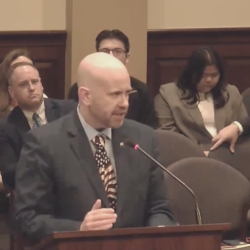I remember working at Idaho Freedom Foundation when Wayne Hoffman gave all employees an assignment to start evaluating how artificial intelligence (AI) could be used in the course of our tasks. I recall making a few silly pictures with Midjourney, as well as using ChatGPT to answer questions about Idaho law and legislative history.
My colleague Niklas Kleinworth once told me he used it to build arguments against his own positions so he could better defend them in essays and policy papers.
Technology has grown exponentially over the past two years. I now routinely use Grok or Copilot to create feature images for my articles, and ChatGPT has become an invaluable tool for research and building my platform.
Here’s a long video by an expert in the field explaining what AI can do. It’s four months old, which is an eternity in this space, but still quite fascinating:
Have you tried Wonk, the AI assistant hosted by Mountain States Policy Center? Right now, Wonk can help you find a bill and answer basic questions about what it purports to do. But I see a future for this kind of technology where it can answer any question about the legislative session—such as how many bills a certain legislator has sponsored, who voted yes or no on a piece of legislation, or how often someone votes with the majority or the minority, and more.
So how do I use AI?
Rather than paying an editor or bugging my wife, I usually use ChatGPT to check for typos and grammatical errors before publishing essays. I also use it to find information, such as specific entries in the Idaho Code or our state constitution. Of course, when using it for research, one must always double-check its work, but it is quickly becoming reliably accurate.
A few months ago, I wanted to include a list of bills in an article and link each one to the correct entry on the legislative website. Rather than spend half an hour clicking through pages and copying links manually, I asked ChatGPT to do it. It completed the task in seconds with 100% accuracy.
I often use AI to evaluate my own arguments. Am I constructing a strawman? Ignoring obvious rebuttals? Engaging in ad hominem? I have to be careful, as ChatGPT is eager to please and often tells me what it thinks I want to hear, but it still makes a good sounding board.
AI is also pretty good at summarization. I can upload a PDF of a Supreme Court case or a long scholarly article and get a reasonable summary in seconds. I can also paste the text of my own articles and get a solid intro tweet or excerpt to use for SEO.
Before last night’s meeting of the Eagle Library Board of Trustees, I used ChatGPT to quickly visualize data related to our population and circulation. I also often use it to do some quick math—for example, projecting the effects of cutting sales taxes across the board versus exempting groceries from the tax. It’s also a great resource for quickly explaining Robert’s Rules of Order.
AI is rapidly replacing my old habit of scouring internet message boards for answers to technical problems. When I run into issues with my website, ChatGPT usually helps me pinpoint the problem quickly. It’s also been invaluable in diagnosing automotive issues and helping me figure out how to fix whatever comes up.
When I couldn’t find a suitably simple plugin to scroll the latest headlines on top of the Gem State Chronicle homepage, ChatGPT wrote a custom script in seconds that did exactly what I wanted it to do.
Over the last couple of days, I’ve been using ChatGPT to write some scripts for Idaho Insider. As longtime readers know, I’ve created a profile page for all 105 legislators, putting as much information as possible in one spot. In addition to a photo, official bio, party affiliation, electoral history, committees, and links to various resources, each profile includes a district map, links to articles I’ve written that mention them, and that lawmaker’s scores from IFF, IACI, and other groups. See Rep. Dale Hawkins as an example.
Updating those scorecards has long been a vexing task. It takes time to edit 105 separate pages and manually insert scores from four or five different organizations. With ChatGPT’s help, I implemented a PHP script that automatically pulls that data from a spreadsheet I can update in just a few minutes. Once the script is set up on each page, I will never again have to update each profile manually; I can simply update the spreadsheet and those numbers are reflected automatically.
I believe the true utility of AI lies in streamlining—or even automating—tedious processes that would otherwise consume valuable time. I know just enough about scripting and web design to tweak what ChatGPT gives me, but I couldn’t have written it from scratch. Having this resource saves me both time and the cost of hiring a professional developer.
Of course, we all must be careful in how we use such tools. We must maintain constant vigilance lest they become crutches that do our thinking for us. The purpose of AI is not to outsource thought, but to give us more time to think on our own. I would caution against any use of AI that substitutes for human reason.
I’d also caution against the temptation to view large language model AIs—ChatGPT, Grok, Copilot, Gemini, Claude, or whatever else—as anything resembling autonomous beings. They are tools, not sentient entities. Watch the 2014 Alex Garland film Ex Machina for a cautionary tale about projecting sentience and human morality onto a machine.
I believe AI is just as revolutionary a technology as the computer, the internet, or the smartphone. We haven’t even scratched the surface of what it will be capable of. It has already opened up potential in my work that I might not otherwise have even dreamed of reaching. Let’s move forward with caution and confidence.
Gem State Chronicle is a reader-supported publication. To receive new posts and support my work, consider becoming a free or paid subscriber.
About Brian Almon
Brian Almon is the Editor of the Gem State Chronicle. He also serves as Chairman of the District 14 Republican Party and is a trustee of the Eagle Public Library Board. He lives with his wife and five children in Eagle.













